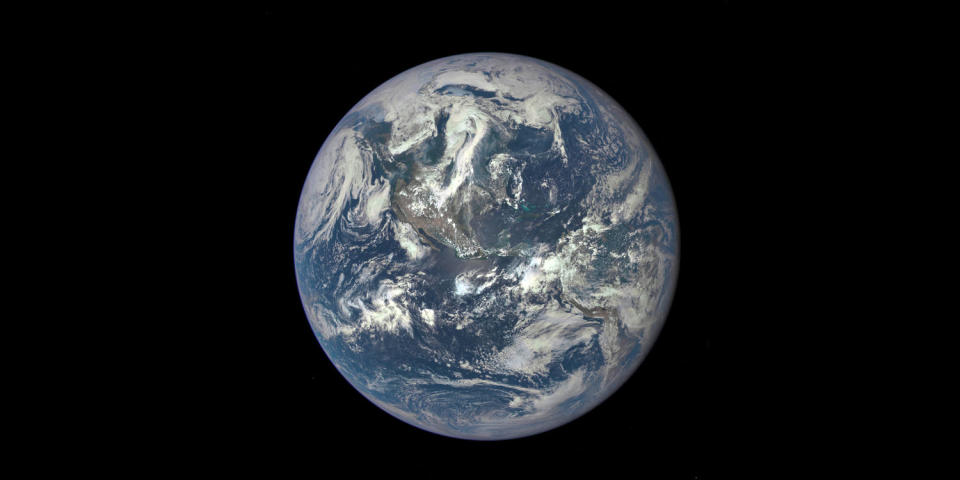Global warming has slowed the Earth’s rotation slightly – and this could affect the way we measure time.
A study published Wednesday shows that the melting of Arctic ice — an accelerating trend caused mainly by human-induced climate change — has caused the Earth to spin less quickly than it would otherwise.
The study’s author, Duncan Agnew, a geophysicist at the Scripps Institution of Oceanography at the University of California San Diego, said that as ice melts at the poles, it changes where Earth’s mass is concentrated. The change in turn affects the planet’s angular velocity.
Agnew compared the dynamics to a figure skater spinning on ice: “If you have a skater who starts spinning, if she lowers her arms or straightens her legs, she will slow down,” he said. But if a skater’s arms are pulled in, the skater will spin faster.
Less solid ice at the poles therefore means more mass around the equator – the center of the Earth.
“What you do with ice melting is you take water that’s frozen in places like Antarctica and Greenland, and that frozen water is melting, and you move the fluids to other places on the planet,” says Thomas Herring, a professor of geophysics at the Massachusetts Institute of Technology who was not involved in the new study. “The water flows away towards the equator.”
In other words, the study suggests that human influence has fueled a force that scholars, stargazers and scientists have pondered for thousands of years – something long considered a constant and beyond humanity’s control.
“It’s quite impressive, even to me, we’ve done something that measurably changes how fast the Earth spins,” Agnew said. “Unprecedented things are happening.”
His study, published in the journal Nature, suggests that climate change plays a role so important in the Earth’s rotation that it postpones the possibility of a ‘negative leap second’. If the Arctic ice had not melted, clocks around the world might have had to subtract a single second as early as 2026 to keep universal time in sync with the Earth’s rotation, which is affected by several factors.
Instead, the impact of climate change has pushed that prospect back by an estimated three years. If timekeeping organizations eventually decide to add a negative leap second, the adjustment could disrupt computer networks.

The reason adjustments to leap seconds are necessary is that even without climate change, Earth’s daily rotation has slowed over time, even though it appears constant.
About 70 million years ago, days were shorter, lasting about 23.5 hours, a study in Paleoceanography and Paleoclimatology suggests. That means Cretaceous dinosaurs experienced a planet with 372 days per year.
Several key factors influence the planet’s rotation, sometimes working in opposite directions.
The friction of the tides in the ocean, due in part to the moon’s gravity, slows the Earth’s rotation. Meanwhile, the Earth’s crust has been rising in some areas since the last ice age in response to the weight of the ice sheets being removed. That effect shifts where the mass is distributed and speeds up the planet’s rotation. Both processes are fairly constant and have predictable rates.
Yet another factor is the movement of fluid in Earth’s liquid inner core — a wild card that can speed up or slow down how fast the Earth spins, Agnew said.
Now melting Arctic ice has been added to the mixture. As climate change increases, researchers expect ice melting to have an even more profound effect on the way the planet spins.
“It will make a greater contribution as time goes on and melting accelerates, as we expect it will likely do,” Herring said. He added that the new study was a thorough, robust analysis that combined research from several scientific disciplines.
The need for timekeepers to adjust universal time to keep in line with the Earth’s rotation is not a new phenomenon. But historically, that meant adding leap seconds to the common standard for clocks, because the Earth’s slower rotation causes astronomical time to lag behind atomic time (which is measured by the vibration of atoms in atomic clocks).
However, in recent decades the Earth has been spinning faster than would otherwise be expected, due to fluctuations in its core. That has prompted timekeepers to consider – for the first time since the official introduction of Universal Time Coordination in the 1960s – whether it might make sense to subtract a leap second to bring universal time into line. keep with the rotation of the earth.
The melting of the Arctic ice has countered this trend and prevented any decision on a negative leap second. By Agnew’s estimates, it has pushed back that possibility by three years — from 2026 to 2029 — if the current rate of Earth’s rotation continues.
Adding and subtracting leap seconds is tricky because they have the potential to disrupt satellite, financial and energy transmission systems that rely on extremely precise timing. Therefore, in 2022, global timekeepers voted to abolish the addition and subtraction of leap seconds by 2035 and allow universal time to deviate from the rate of Earth’s rotation.
“Since about 2000, there has been talk of an effort to abolish leap seconds,” Agnew said.
Regardless of whether the clocks change, the idea that melting Arctic ice affects the Earth’s rotation shows how important an issue it has become. Research has already described the profound impact ice loss will have on coastal communities.
Scientists expect sea level rise to accelerate as the climate warms, a process that will continue for hundreds of years. Last year, top polar researchers warned in a report that parts of major ice sheets could collapse and that coastal communities should prepare for many meters of sea level rise. If humanity allows the average temperature on Earth to rise by 2 degrees Celsius, sea level rise of more than 12 meters could happen.
This article was originally published on NBCNews.com